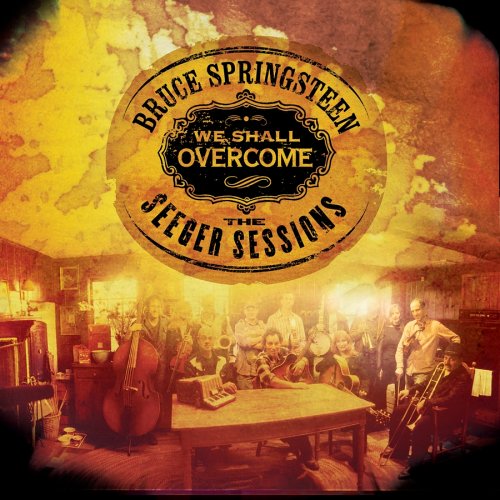
We Shall Overcome: The Pete Seeger Sessions (2006)

1. Old Dan Tucker
2. Jesse James
3. Mrs. McGrath
4. O Mary Don't You Weep
5. John Henry
5. Erie Canal
7. Jacob's Ladder
8. My Oklahoma Home
9. Eyes on the Prize
10.Shenandoah
11.Pay Me My Money Down
12.We Shall Overcome
13.Froggie Went a Courtin'
- bonus tracks - American Land Edition -
14.Buffalo Gals
15.How Can I Keep From Singing
16.How Can a Poor Man Stand Such Times and Live
17.Bring 'Em Home
18.American Land
Rarely does an artist of Bruce Springsteen’s stature so joyfully detour from the weight of their own legacy. We Shall Overcome: The Seeger Sessions is not an album of protest in the conventional sense, nor is it simply a tribute to folk icon Pete Seeger. Rather, it is an ebullient reclamation of America’s musical roots — not as museum piece, but as a living, stomping, shouting, laughing force. In Springsteen’s hands, these songs — many dating back to the 19th century — are given new life, not through reverence, but through sheer exuberance.
The title may mislead the uninitiated. We Shall Overcome conjures images of hushed church gatherings and solemn marches. Yet here, Springsteen turns those expectations inside out. From the first notes, this is a record fueled not by grief or didacticism, but by joy — ragged, rowdy, full-throated joy. The closest musical comparison is not Seeger himself, but perhaps Dylan and The Band’s Basement Tapes: loose, unvarnished, and unmistakably alive.
The recording process — famously casual and famously fruitful — adds to the mystique. Eschewing rehearsals, Springsteen corralled a sprawling ensemble of musicians into his farmhouse and simply played. Tubas, banjos, accordions, washboards, and horns weave in and out of the arrangements with unfiltered spontaneity. The result is more than a studio album; it’s a document of a gathering — communal, kinetic, and thrillingly off-script.
Tracks like Erie Canal, My Oklahoma Home, and O Mary Don’t You Weep emerge as riotous highlights, sounding less like covers than reclaimed national anthems for the unsung and the overlooked. Mrs. McGrath, an Irish anti-war ballad dating back centuries, is transformed into a stomping, swinging, clapping juggernaut — a remarkable feat, considering its grim narrative.
And yet, not all is levity. The final stretch of the album reclaims the protest heart of Seeger’s legacy. The title track, How Can a Poor Man Stand Such Times and Live, and Eyes on the Prize shift the tone to something more reflective, if not mournful. These are powerful performances in their own right, but juxtaposed against the earlier songs’ festive buoyancy, they cast a long, almost dissonant shadow. One wishes the sequencing allowed the record to sustain its initial momentum without quite so abrupt a shift into sermon.
Still, what remains is a triumph — a folk revival project that refuses to sound pious or archival. Springsteen, ever the storyteller of the working class, finds new voice here by channeling the old ones. And he does so with an energy so infectious that even the most familiar songs sound startlingly fresh.
As for the so-called bonus tracks — including the rousing Buffalo Gals and the anthemic American Land — they are anything but superfluous. Their omission from the standard tracklist is puzzling, as they embody the album’s spirit as fully as any of the originals.
In the end, The Seeger Sessions is not just a tribute, but a reanimation. It reminds us that protest can be noisy, raucous, and deeply fun — and that the past, when played with this much heart, has plenty left to say.
Go back to the main page
Go To Next Review